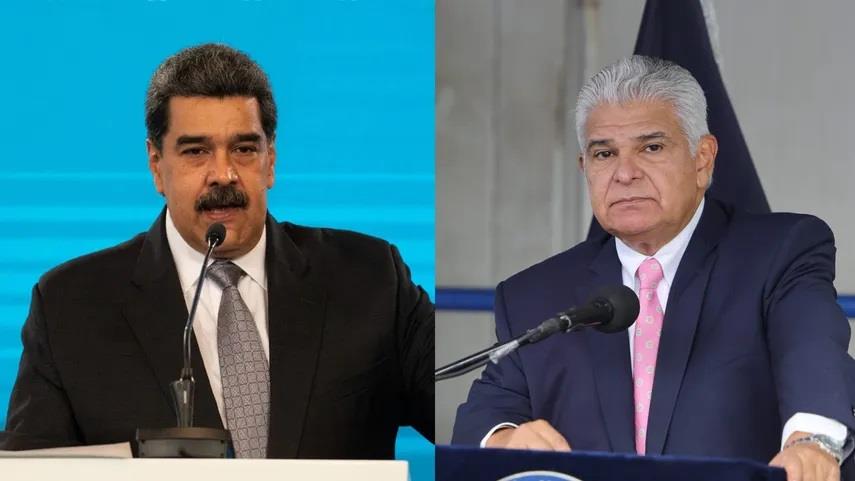
The Panama President Mulino Offer Of Asylum To Venezuelan President Maduro Was Rejected Vehemently
Nicolás Maduro.“President of Panama, I will try to learn your name, but whoever messes with Venezuela will dry up. You have a pressure cooker in Panama; you were elected by a very small sector of the Panamanian right. Govern Panama, do not try to govern Venezuela, and be careful because those who mess with us will dry up,” said Maduro in response to Mulino's statements.
Panama is being accused of following the US agenda after offering asylum to President Nicolás Maduro of Venezuela if he was forced to leave Venezuela.
Maduro's response came after Mulino called a regional summit of presidents to address the crisis in Venezuela, due to allegations of fraud in the presidential elections, whose official result was ratified by the head of state.
Diosdado Cabello, vice president of the Socialist Party of Venezuela, also reacted angrily, referring to Mulino as a“low-level spokesman for imperialism.”
The opposition has denounced the increased repression of protests, which have already left 26 dead and thousands arrested.
Maduro questioned the Panamanian president's proposal and warned that "whoever messes with Venezuela dries up," and recommended that he focus on governing Panama instead of interfering in Venezuela's internal affairs.
Mulino, in an interview, reaffirmed his willingness to offer political asylum to Maduro and other members of Chavismo, if that would help resolve the crisis in Venezuela.
Mulino said Panama would be willing to facilitate a transition for Maduro to a third country, although he acknowledged that it would be difficult to sell this idea to the Panamanian population.
This offer of asylum comes in a context of growing tension following the presidential elections in Venezuela, in which the National Electoral Council (CNE) proclaimed Maduro the winner with more than 51% of votes.
However, the opposition led by María Corina Machado and Edmundo González Urrutia, as well as several international observers, including the Carter Center, have questioned the transparency of the electoral process, denouncing fraud.
González Urrutia, who is recognized as the winner of the elections by the opposition and several countries, including Panama and the United States, yesterday asked Maduro to stop the violence unleashed after the elections of July 28 and accept that he lost the elections.
The anti-Chavez bloc claims that the records available to the public through the website resultadosconvzla
correspond to 83.50% of the issued vouchers, and were collected by thousands of volunteers during the Election Day as opposition witnesses.
Last week, María Corina Machado decided to limit her public appearances precisely out of fear of arrest.
The opposition leader has been giving interviews to the press on social media in recent hours. Meanwhile, former presidential candidate Enrique Márquez, along with other sectors, has urged the CNE to publish the detailed results of the elections and has warned that the lack of transparency could have serious consequences for the country, which has already seen violent protests and mass arrests in response to Maduro's proclamation.
According to the NGO Foro Penal, which leads the defense of those considered political prisoners in the country, as of Saturday it had recorded 1,303 verified arrests, produced in the post-electoral situation, which includes 170 women, 116 adolescents, 14 indigenous people and 16 people with disabilities. There are also reports of 24 civilian deaths due to protests and violent incidents, as well as two military deaths and nearly a hundred security agents injured. Venezuela's Supreme Court (TSJ), controlled by Chavez, has announced that it will review the documents submitted in the process of validating the election results, a procedure that has been criticized by the opposition, which considers that the TSJ is not competent to resolve the electoral conflict and that said validation should be carried out by the CNE, with the results published in detail. The situation in Venezuela remains tense, with the international community watching closely and several regional leaders, including the presidents of Mexico, Colombia and Brazil, opting for a cautious stance in the face of the crisis.

Legal Disclaimer:
MENAFN provides the
information “as is” without warranty of any kind. We do not accept
any responsibility or liability for the accuracy, content, images,
videos, licenses, completeness, legality, or reliability of the information
contained in this article. If you have any complaints or copyright
issues related to this article, kindly contact the provider above.
Most popular stories
Market Research
- Thinkmarkets Adds Synthetic Indices To Its Product Offering
- Ethereum Startup Agoralend Opens Fresh Fundraise After Oversubscribed $300,000 Round.
- KOR Closes Series B Funding To Accelerate Global Growth
- Wise Wolves Corporation Launches Unified Brand To Power The Next Era Of Cross-Border Finance
- Lombard And Story Partner To Revolutionize Creator Economy Via Bitcoin-Backed Infrastructure
- FBS AI Assistant Helps Traders Skip Market Noise And Focus On Strategy




















Comments
No comment